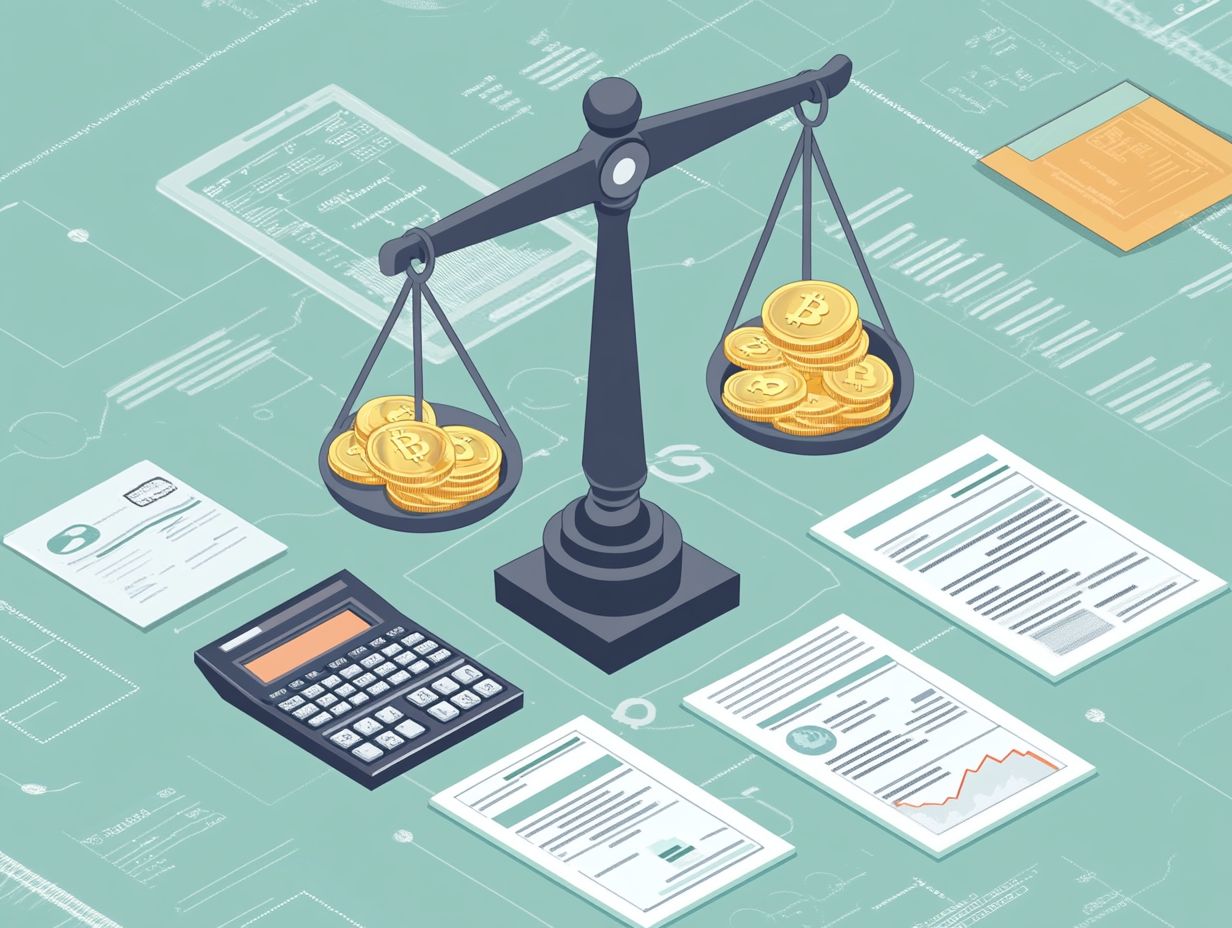Tax Implications of Digital Gold and Cryptocurrency
In today s digital world, assets like digital gold and cryptocurrency are transforming our view of wealth and investment.
While each offers distinct advantages, the tax implications can be intricate and often misunderstood. This article uncovers key differences and tax implications between digital gold and cryptocurrency, explores current tax laws and regulations, and outlines reporting requirements for taxable events.
You ll discover how these digital assets affect capital gains and losses, along with potential tax planning strategies. Understanding these nuances is crucial for making informed financial decisions.
Contents
- Key Takeaways:
- Understanding Digital Gold and Cryptocurrency
- Taxation of Digital Gold
- Taxable Events and Reporting Requirements
- Taxation of Cryptocurrency
- Current Tax Laws and Regulations
- Taxable Events for Cryptocurrency
- Impact of Cryptocurrency on Taxes
- Final Thoughts on Digital Assets and Taxation
- Frequently Asked Questions
- What are the tax implications of owning digital gold?
- Do I have to pay taxes on cryptocurrency transactions?
- How is the value of digital gold and cryptocurrency determined for tax purposes?
- Are there any tax breaks or deductions for investing in digital gold or cryptocurrency?
- Are there any reporting requirements for digital gold and cryptocurrency transactions?
- Can I use digital gold and cryptocurrency losses to offset other capital gains?
Key Takeaways:

- Digital gold and cryptocurrency are two distinct assets, with different characteristics and tax implications.
- Both digital gold and cryptocurrency are subject to current tax laws and regulations, with specific taxable events and reporting requirements.
- Cryptocurrency can significantly impact taxes, affecting capital gains and losses while also providing potential tax planning opportunities.
Understanding Digital Gold and Cryptocurrency
Digital gold and cryptocurrency are changing how we see assets and value representation. As financial interests evolve, digital assets like Bitcoin and stablecoins have come to the forefront, leveraging blockchain technology to facilitate secure, decentralized transactions.
Cryptocurrencies, including CBDCs and NFTs, introduce new dimensions of ownership and value, fundamentally redefining your approach to investments, tax returns, and taxable income. Additionally, understanding the tax implications of selling precious metals to a dealer is crucial for navigating the contemporary financial landscape, particularly with the rise of DeFi lending and smart contracts.
Taxation of Digital Gold
Taxing digital gold is similar to taxing traditional assets, with important considerations for capital gains and reporting obligations under IRS regulations. Digital assets like Bitcoin are classified as capital assets, meaning any profits from their sale could result in capital gains, necessitating meticulous record-keeping for your tax returns.
You also need to navigate intricate guidelines and forms, such as Form 1040 and Publication 544, to accurately report your earnings and ensure compliance with transaction reporting requirements.
Current Tax Laws and Regulations
Current tax laws and regulations surrounding digital gold require you to adhere to IRS guidelines, especially when reporting the sale of these assets on your tax return. Specifically, you’ll need to use Form 1040 to declare any capital gains or losses from selling digital assets like Bitcoin and NFTs. Consulting Publication 544 for detailed instructions on these transactions is wise.
Navigating these regulations can be complex, as the IRS classifies digital gold as property, meaning all transactions involving these assets could carry tax implications. You need to understand how to determine the basis for calculating gains or losses, and recognize that any profit made from selling digital gold is subject to capital gains tax.
If you engage in multiple transactions throughout the year, keeping meticulous records becomes essential for accurate reporting. Remember, losses can potentially offset gains, leading to a more favorable financial outcome during tax preparation. Utilizing Publication 544 can provide clarity on these matters, ensuring compliance and minimizing the risk of an audit.
Taxable Events and Reporting Requirements

Taxable events associated with digital gold encompass various transactions that can trigger capital gains or losses. This makes careful transaction reporting and record-keeping essential.
Each time you sell or exchange a digital asset, it may yield taxable income. Understanding what qualifies as a taxable event is crucial, which includes transactions involving smart contracts, decentralized finance (DeFi) activities, and the tax responsibilities of precious metals investors.
For example, if you transfer digital gold in a peer-to-peer transaction or use it as collateral for loans, be mindful of the significant tax implications. Understanding the importance of tax planning for precious metals investors is crucial, as you’ll need to calculate gains or losses from such transactions against the asset’s acquisition cost.
The ramifications of capital gains tax can be substantial, particularly for those who trade frequently in digital assets. Therefore, maintaining careful records is vital for accurately reporting each transaction and ensuring compliance with tax regulations.
This diligence not only promotes effective financial management but also safeguards against potential audits or penalties from tax authorities. Don’t miss out on understanding these requirements!
Taxation of Cryptocurrency
Cryptocurrency taxation can be complex, intricately governed by specific IRS regulations that classify these digital assets as property. This means they are subject to capital gains taxes.
When you buy, sell, or exchange cryptocurrencies like Bitcoin or stablecoins, it s imperative that you accurately report these transactions. Typically, this involves using Form 8949 to document any capital gains or losses on your tax returns.
Current Tax Laws and Regulations
You must report any transactions involving digital assets to the IRS, treating these assets as capital items. This means filling out a tax return using Form 8949, where you document capital gains and losses from any sale or exchange of cryptocurrencies, following IRS guidelines and Publication 551.
Understanding these requirements is essential if you re diving into cryptocurrency trading. Not following the rules could lead to hefty penalties or audits. Therefore, you should track every transaction carefully note the date, value, and purpose so you have solid proof for your entries if they ever come under scrutiny.
Form 8949 not only simplifies compliance but also provides an organized method for reporting. It enables you to effectively categorize both short-term and long-term gains. Keeping adequate records strengthens your position with the IRS, showcasing your commitment to navigating the complex tax obligations associated with digital currencies and understanding the financial benefits of tax-deferred precious metal accounts.
Taxable Events for Cryptocurrency
Taxable events for cryptocurrency encompass a variety of actions that can lead to capital gains or taxable income. This includes trading, selling, or even using crypto to purchase goods or services. It s vital for you to grasp the implications of these transactions, especially with the emergence of smart contracts and DeFi lending.
For example, if you engage in DeFi lending, you may trigger taxable events when you earn interest or swap assets. The automation of transactions through smart contracts can blur the lines between taxable income and capital losses, making careful record-keeping essential. Each transaction type comes with its own reporting requirements, and failing to accurately account for them could lead to penalties.
Staying informed about your taxable events and their impact on your overall tax obligations is crucial for anyone involved in cryptocurrency activities, especially when considering investments in precious metals. Understanding the cost of ignoring tax obligations for gold investments can help you manage your financial responsibilities effectively.
Impact of Cryptocurrency on Taxes

The impact of cryptocurrency on taxes is significant, presenting you with unique challenges and opportunities regarding capital gains and losses that demand effective tax planning strategies.
As you navigate the intricacies of transaction reporting and record-keeping, grasping these implications is essential for optimizing your financial outcomes and minimizing your taxable income. Consider seeking advice from a tax expert to ensure you re compliant with all regulations.
Effects on Capital Gains and Losses
The effects of cryptocurrency on your capital gains and losses are substantial. The volatility of these digital assets can lead to significant fluctuations in your taxable income. Every transaction involving cryptocurrency may trigger a capital gain or loss. Therefore, it’s essential to report these transactions on your tax returns to accurately reflect your financial situation.
Stay alert because the market can change in an instant. For example, a sudden downturn can turn what seemed like a profitable investment into a considerable loss overnight.
This unpredictability complicates the calculation of your net gains or losses and impacts your overall tax liabilities. This requires careful tracking of your transactions. Accurate documentation is crucial to ensure that any potential tax implications are clear and compliant with regulations.
As the landscape of digital currency evolves, understanding the tax obligations of precious metals will be vital for your effective financial planning.
Potential Tax Planning Strategies
Potential tax planning strategies for cryptocurrency investors can help you optimize capital gains and manage your taxable income effectively. By employing techniques such as tax-loss harvesting which means selling losing investments to offset gains and timing your transactions strategically, you can minimize your overall tax burden.
Understanding the importance of holding periods is essential. Assets held for over a year typically qualify for lower long-term capital gains rates, enhancing your tax efficiency. Additionally, it’s crucial to consider the tax implications of precious metals in business ventures and proactively plan by selecting jurisdictions where taxes are more favorable for crypto transactions.
You can also utilize tax-advantaged accounts, like IRAs, which allow your investments to grow tax-deferred. Keeping careful records of your purchases, sales, and conversions ensures you can substantiate your claims in the event of an audit, providing a solid foundation for your financial strategies.
Final Thoughts on Digital Assets and Taxation
Final thoughts on digital assets and taxation highlight the increasing necessity of understanding IRS regulations surrounding cryptocurrencies and digital gold. As this landscape shifts, you must remain vigilant about your obligations regarding tax returns and the treatment of capital gains. This diligence helps you avoid penalties while optimizing your financial strategies.
In this fast-paced environment, if you’re investing in digital assets, it’s wise to adopt strategies like:
- keeping careful records of your transactions,
- using crypto tax software, and
- seeking professional advice to navigate the complexities of reporting.
Staying attuned to legislative changes is essential, as the IRS continually updates its guidelines in response to advancements in blockchain technology and digital currencies.
You should also appreciate the significance of accurately categorizing your investments. Distinguishing between long-term and short-term holdings can maximize your potential savings. Taking a proactive approach not only aids in adhering to tax laws but also significantly enhances your overall financial management.
Frequently Asked Questions
In this section, we address some common queries regarding digital assets and their tax implications.

What are the tax implications of owning digital gold?
The tax implications of owning digital gold are similar to those of owning physical gold. Any profits from selling or exchanging digital gold may be subject to capital gains tax, while losses may be deductible.
Do I have to pay taxes on cryptocurrency transactions?
Yes, cryptocurrency transactions are subject to capital gains tax. This includes buying, selling, and exchanging cryptocurrencies, as well as using them to purchase goods or services.
How is the value of digital gold and cryptocurrency determined for tax purposes?
The value of digital gold and cryptocurrency is determined by the fair market value at the time of the transaction. You can find this information through reputable exchanges and pricing websites.
Are there any tax breaks or deductions for investing in digital gold or cryptocurrency?
Currently, there are no specific tax breaks or deductions for investing in digital gold or cryptocurrency. However, any losses incurred from these investments may be deductible.
Are there any reporting requirements for digital gold and cryptocurrency transactions?
Yes, the IRS requires individuals to report any gains or losses from digital gold and cryptocurrency transactions on their tax returns. Failure to do so may result in penalties and fines.
Can I use digital gold and cryptocurrency losses to offset other capital gains?
Yes, digital gold and cryptocurrency losses can be used to offset other capital gains in the same tax year. However, there are limits to the amount of losses that can be deducted in a single year.














